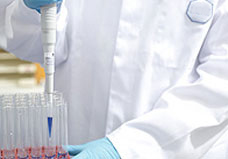| |
 |
|
|
|
|
|
|
Paramyotonia Congenita |
|
|
What is Paramyotonia
Congenita
Paramyotonia congenita is a disorder that affects muscles used for
movement (skeletal muscles). Beginning in infancy or early
childhood, people with this condition experience bouts of
sustained muscle tensing (myotonia) that prevent muscles from
relaxing normally. Myotonia causes muscle stiffness that typically
appears after exercise and can be induced by muscle cooling. This
stiffness chiefly affects muscles in the face, neck, arms, and
hands. Unlike many other forms of myotonia, the muscle stiffness
associated with paramyotonia congenita tends to worsen with
repeated movements.
Most people—even those without muscle disease—feel that their
muscles do not work as well when they are cold. This effect is
dramatic in people with paramyotonia congenita. Exposure to cold
initially causes muscle stiffness in these individuals, and
prolonged cold exposure leads to temporary episodes of mild to
severe muscle weakness that may last for several hours at a time.
How common is paramyotonia congenita?
Paramyotonia congenita is an uncommon disorder; it is estimated to
affect fewer than 1 in 100,000 people.
What genes are related to paramyotonia
congenita?
Mutations in the SCN4A gene cause paramyotonia congenita.
The SCN4A gene provides instructions for making a protein that is
critical for the normal function of skeletal muscle cells. For the
body to move normally, skeletal muscles must tense (contract) and
relax in a coordinated way. Muscle contractions are triggered by
the flow of positively charged atoms (ions), including sodium,
into skeletal muscle cells. The SCN4A protein forms channels that
control the flow of sodium ions into these cells.
Mutations in the SCN4A gene alter the usual structure and function
of sodium channels. The altered channels cannot properly regulate
the flow of sodium ions into skeletal muscle cells. The resulting
increase in ion flow interferes with normal muscle contraction and
relaxation, leading to episodes of myotonia or muscle weakness.
|
|
|
|
Paramyotonia Congenita - treatment of
Paramyotonia Congenita, Paramyotonia Congenita types, Disease medicines,
Paramyotonia Congenita symptoms, Paramyotonia Congenita and Disease
symptoms, Paramyotonia Congenita symptoms Disease and diagnosis, Symptoms
and Solutions, Signs and Symptoms, type of Paramyotonia Congenita, cause
common, common Paramyotonia Congenita, Paramyotonia Congenita List, causes
list, Infectious Paramyotonia Congenita, Causes, Diseases , Types,
Prevention, Treatment and Facts, Paramyotonia Congenita information,
Paramyotonia Congenita: Definition, Paramyotonia Congenita names, medical
Paramyotonia Congenita, medical Paramyotonia Congenita and disorders, cell
Paramyotonia Congenita, Paramyotonia Congenita Worldwide, Paramyotonia
Congenita Research, Paramyotonia Congenita Control, Paramyotonia Congenita
Center, Digestive Paramyotonia Congenita Week, Information about
Paramyotonia Congenita, causes of different Paramyotonia Congenita,
Paramyotonia Congenita Articles, Paramyotonia Congenita and conditions,
Health and Paramyotonia Congenita, Paramyotonia Congenita Patients,
Paramyotonia Congenita and Sciences, causes of alzheimer's Paramyotonia
Congenita, Paramyotonia Congenita causes, alternative medicine heart
Paramyotonia Congenita, body ailments, Paramyotonia Congenita medicines,
medical antiques, type of blood Paramyotonia Congenita |
|
|





